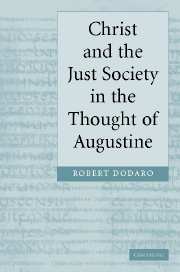Book contents
- Frontmatter
- Contents
- Acknowledgements
- List of abbreviations
- Introduction
- 1 Eloquence and virtue in Cicero's statesman
- 2 Justice and the limits of the soul
- 3 Christ and the formation of the just society
- 4 Divine eloquence and virtue in the scriptures
- 5 Wisdom's hidden reasons
- 6 Eloquence and virtue in Augustine's statesman
- General conclusion
- Select bibliography
- Index of references to Augustine's works
- Index of persons and subjects
General conclusion
Published online by Cambridge University Press: 22 September 2009
- Frontmatter
- Contents
- Acknowledgements
- List of abbreviations
- Introduction
- 1 Eloquence and virtue in Cicero's statesman
- 2 Justice and the limits of the soul
- 3 Christ and the formation of the just society
- 4 Divine eloquence and virtue in the scriptures
- 5 Wisdom's hidden reasons
- 6 Eloquence and virtue in Augustine's statesman
- General conclusion
- Select bibliography
- Index of references to Augustine's works
- Index of persons and subjects
Summary
Just two years after the sack of Rome by Alaric, at the time when Augustine begins work on the City of God, Flavius Marcellinus informs him of a complaint by the pagan proconsul of Africa, Rufius Volusianus, that the non-violence preached by Christ diminishes Christianity's capacity to defend the Roman Empire, and that Christian emperors have in fact harmed it. At the same time, Volusianus writes to Augustine about his objections over the incarnation. How can God be present in Jesus, the proconsul asks, and why, if Christ is God, are his miracles so less impressive than those of other wise and holy miracle-workers in history? Augustine's letters to Marcellinus and Volusianus (Letters 138, 137) reveal how seriously he views these challenges to the political significance of the Christian faith. Both in his letters to public officials and in the City of God he takes as his point of departure what Cicero says in De re publica concerning the statesman and the virtues through which Rome's leading citizens had earlier maintained the justice and security of the res publica. At the heart of Augustine's denial in Books 2 and 19 of the City of God that Rome was ever a true commonwealth is his conviction that it never practised true justice.
- Type
- Chapter
- Information
- Christ and the Just Society in the Thought of Augustine , pp. 215 - 218Publisher: Cambridge University PressPrint publication year: 2004



